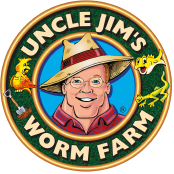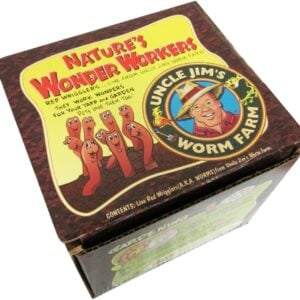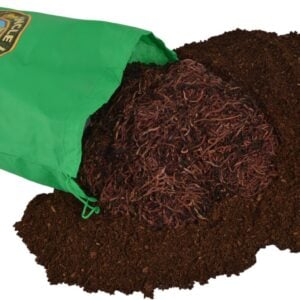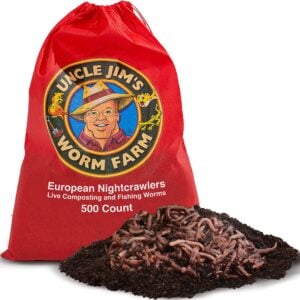Vermicomposting Supplies
Blog Category

Top Selling Products
Vermicomposting
Worm Composting Bin Troubleshooting Guide
When something goes wrong with your worm composting bin, this Troubleshooting Guide can help! Bookmark this page and return whenever you think something is amiss with your worm bin. Uncle Jim’s Worm Farm is the #1 supplier of composting worms in the USA. We’ve been growing and selling worms for more than 40 years. Click […]
Simply by doing what comes naturally, worms are helping humans. These small invertebrates eat organic matter and excrete fertilizer. This process improves soil quality and increases crop yields. Farmers, institutions, and householders have learned how to harness the power of composting with worms. Vermicomposting is cooler and faster than composting without worms. How is composting […]
Composting worms make food scraps break down quickly, but some foods can hurt them. Vermicomposting with worms is increasingly popular with people who want to reduce trash, produce free fertilizer, and save resources. Therefore, vermicomposting fans have a vested interest in keeping their Red Worms or European Night Crawlers healthy. Worms can break down a […]
People who compost their kitchen scraps need a compost pail. The compost pail stores organic material for a few days. When some scraps have accumulated, just dump the fruit and vegetable trimmings and wasted produce into the compost bin. Which compost pails are the best? What are the pros and cons of each type of […]
Vermicomposting vs. Hot Composting
Many of our customers ask, “What’s the difference between vermicomposting with worms and regular composting?” Here at Uncle Jim’s Worm Farm, we are experts on composting with worms. Let’s explore how these processes are similar, and how they differ. Which method is more convenient? How can you produce high-quality organic fertilizer for your garden and […]
Composting is the natural process of breaking down organic materials into fertilizer. In our modern world, unwanted items go into the trash by default. Trash is stored in a landfill or incinerated. This process is an utter waste of resources. Composting has many benefits for the household and the earth. Finished compost also creates free […]
Vegetable scraps are obviously compostable, but some beverage waste is also perfect for composting with red worms. Composting worms speed up the process, breaking down inedibles and left-overs into a dark, rich organic fertilizer. This is called vermicomposting. Red worms are the best for vermicomposting. People who compost may overlook their compostable beverage waste. However, […]
In a vermicomposting bin, bedding is the material that composting worms live in. When you set up a worm bin, you will need to add bedding before putting the worms on top. What is the purpose of bedding? Which types of bedding are best? How do you prepare the bedding, and when should you add […]
Composting kitchen and garden scraps using worms is faster than without worms. Adding a bag of composting worms results in richer compost. This dark compost is treasured by gardeners because it contains soil nutrients and living bacteria. Composting with worms is called “vermicomposting.” Vermicomposting is easy, and it’s a fun hobby too! Children and adults […]
With warmer weather coming, people who compost with worms are anticipating the planting season! Gardeners are making lists and garden layouts on graph paper or computers. Lawn owners are contemplating whether to sow more seed and when to fertilize. Meanwhile, the composting worms are munching away, making compost from kitchen scraps. It’s nearly time for […]



